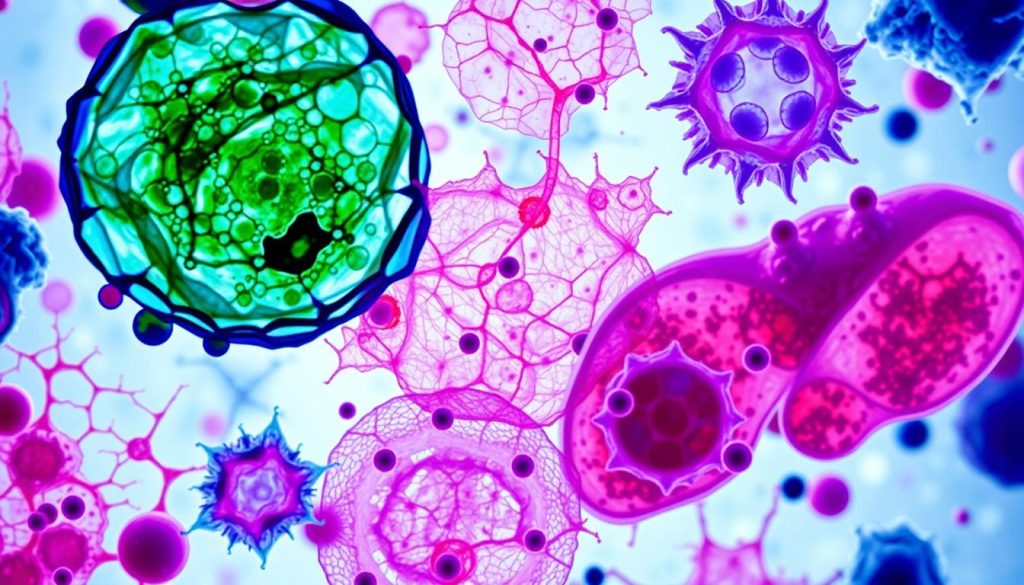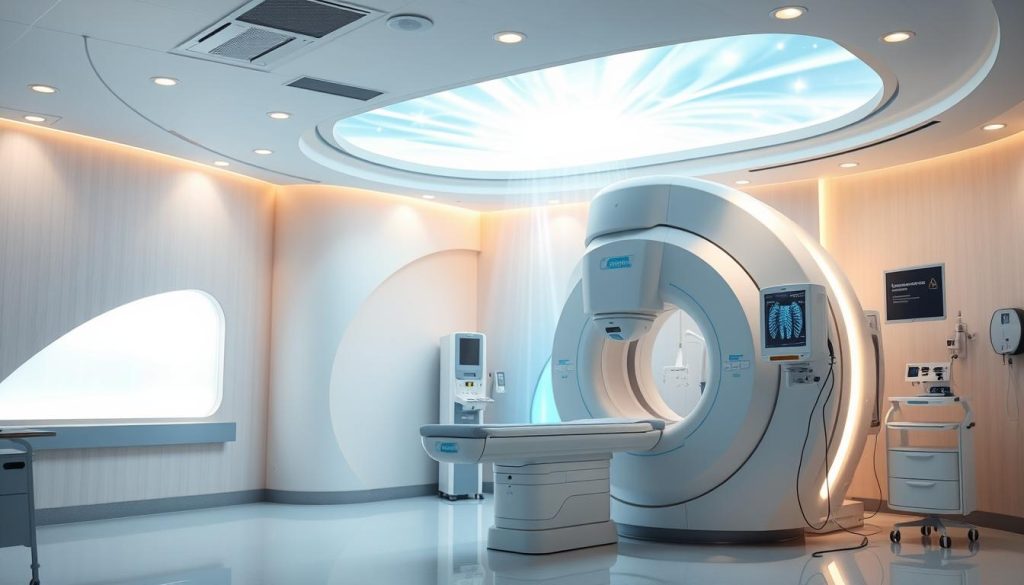Stage 4 cancer is a serious stage. It’s when cancer has spread to other parts of the body. This can be scary, but knowing what to expect can help. We’ll look into what stage 4 cancer is. We’ll talk about its symptoms and treatment choices. Our goal is to give clear, helpful information to those dealing with this tough time.
We’ll cover everything from getting a diagnosis to new treatments. We’ll also talk about keeping a good quality of life and finding support. Let’s learn about stage 4 cancer together, and help those affected by it.
What is Stage 4 Cancer: Definition and Basic Understanding
Stage 4 cancer, also known as metastatic cancer, is the most advanced stage. At this point, cancer cells have spread to other parts of the body. It’s important for patients and their families to understand this.
Medical Definition of Metastatic Cancer
Metastatic cancer happens when cancer cells break away and travel to other organs. This makes it hard to treat because it affects many parts of the body.
How Cancer Reaches Stage 4
Cancer becomes stage 4 when it grows and spreads without control. This can happen fast or slowly, depending on the cancer and individual factors. Early detection and screenings are key to preventing this.
Differences Between Stage 3 and Stage 4
The main difference is how far the cancer has spread. Stage 3 cancer is usually in nearby areas, while stage 4 has spread to distant parts. Here’s a table showing the main differences:
| Characteristic | Stage 3 Cancer | Stage 4 Cancer |
|---|---|---|
| Spread | Local or regional | Distant organs |
| Treatment goal | Often curative | Usually palliative |
| Prognosis | Generally better | More challenging |
Even though stage 4 is serious, new treatments are helping many patients with metastatic cancer.
Common Types of Stage 4 Cancer
Stage 4 cancer, also known as metastatic cancer, can affect various parts of the body. Let’s explore some of the most common types of advanced cancer and how they impact patients.

Breast cancer often spreads to bones, liver, lungs, and brain. When it reaches stage 4, patients may experience bone pain, breathing difficulties, or neurological symptoms. Lung cancer typically metastasizes to the brain, bones, liver, and adrenal glands. Symptoms can include headaches, bone pain, and jaundice.
Colorectal cancer usually spreads to the liver and lungs. Patients might notice unexplained weight loss, abdominal pain, or changes in bowel habits. Prostate cancer commonly metastasizes to bones, causing pain and increasing fracture risk.
| Cancer Type | Common Metastasis Sites | Key Symptoms |
|---|---|---|
| Breast | Bones, liver, lungs, brain | Bone pain, breathing issues, neurological symptoms |
| Lung | Brain, bones, liver, adrenal glands | Headaches, bone pain, jaundice |
| Colorectal | Liver, lungs | Weight loss, abdominal pain, bowel changes |
| Prostate | Bones | Bone pain, increased fracture risk |
Understanding these common types of stage 4 cancer helps patients and caregivers recognize symptoms. This way, they can seek medical care early. Early detection and treatment can improve prognosis and quality of life for those with metastatic cancer.
Early Warning Signs and Symptoms of Advanced Cancer
Spotting the signs of stage 4 cancer early can lead to quicker medical help. This can improve how symptoms are managed. Symptoms vary based on the cancer type and where it is. Yet, there are common signs to look out for.
Physical Symptoms
As cancer gets worse, physical changes happen. These might include losing weight without trying, feeling very tired, or skin color changes. Some people get night sweats or fever without a clear reason.
Systemic Symptoms
Stage 4 cancer can impact the whole body. Systemic symptoms might include:
- Unexplained pain in various parts of the body
- Loss of appetite
- Difficulty swallowing
- Changes in bowel or bladder habits
Organ-Specific Signs
Depending on where cancer spreads, specific symptoms can occur. For example, lung metastases might cause shortness of breath. Brain metastases could lead to headaches or vision changes. Liver involvement might cause yellow skin or eyes.
If you see any of these symptoms, seeing a healthcare provider quickly is key. Early detection and proper management can greatly improve life quality for those with stage 4 cancer.
How Stage 4 Cancer is Diagnosed
Diagnosing stage 4 cancer requires several tests to find out how far the disease has spread. Doctors use different methods to confirm the cancer has advanced. They then plan the best treatment.
- Imaging tests (CT scans, MRIs, PET scans)
- Blood tests to check for tumor markers
- Biopsies to examine tissue samples
- Genetic testing to identify specific mutations
Imaging tests are key in spotting metastases, which are common in stage 4 cancer. These scans show tumors in various body parts. They confirm the cancer has spread beyond its original place.
Biopsies are very important in diagnosing advanced cancer. They involve taking a small tissue sample for lab tests. This helps find out the cancer type and its genetic details. It guides treatment choices.
| Diagnostic Method | Purpose | Relevance to Stage 4 Cancer |
|---|---|---|
| CT Scan | Detailed cross-sectional images | Identifies metastases in organs |
| PET Scan | Detects metabolic activity | Reveals active cancer cells throughout the body |
| Liquid Biopsy | Analyzes cancer DNA in blood | Monitors treatment response and disease progression |
Getting an accurate stage 4 cancer diagnosis is key for a good treatment plan. It helps doctors choose the best way to manage the disease. This improves the patient’s quality of life.
Understanding Cancer Staging Systems
Cancer staging helps doctors figure out how far the disease has spread. Staging systems provide key information about the tumor size, lymph node involvement, and more. Let’s look at the main staging methods for stage 4 and advanced cancer cases.
TNM Classification System
The TNM system is the most common method for cancer staging. It looks at three main factors:
- T (Tumor): Size and extent of the main tumor
- N (Nodes): Spread to nearby lymph nodes
- M (Metastasis): Spread to distant parts of the body
Doctors use numbers to describe each factor. For stage 4 cancer, the M category is always positive, showing distant spread.
Other Staging Methods
While TNM is common, some cancers use different systems:
- Brain tumors: WHO grading system
- Blood cancers: Ann Arbor staging
- Melanoma: Clark levels and Breslow depth
Importance of Accurate Staging
Accurate staging is very important for several reasons:
| Benefit | Impact |
|---|---|
| Treatment planning | Guides choice of therapy options |
| Prognosis estimation | Helps predict survival rates |
| Research | Enables comparison of treatment outcomes |
| Communication | Facilitates clear discussions among healthcare teams |
Understanding staging helps patients talk better with their doctors. For those with advanced cancer, knowing the stage is key for making important treatment and care choices.
Treatment Options for Metastatic Cancer
Advanced cancer needs a detailed treatment plan. Doctors have many options for patients with metastatic disease. These aim to slow cancer growth, reduce symptoms, and improve life quality.

Systemic Therapies
Systemic therapies treat cancer all over the body. Chemotherapy is a common treatment for advanced cancer. It uses drugs to kill fast-growing cells.
Hormone therapy is another option for cancers that grow with hormones.
Targeted Treatments
Targeted treatments focus on specific changes in cancer cells. These drugs block cancer growth by targeting certain molecules. They often have fewer side effects than traditional chemotherapy.
Immunotherapy Options
Immunotherapy boosts the body’s natural defenses against cancer. It helps the immune system attack cancer cells. This treatment has shown promise in treating various advanced cancers.
Every patient’s treatment plan is unique. Doctors consider the cancer type, stage, and overall health when choosing the best approach. They may use one or more treatments to manage advanced cancer effectively.
The Role of Chemotherapy in Advanced Cancer
Chemotherapy is key in treating stage 4 cancer. It uses drugs to kill cancer cells everywhere in the body. For those with advanced cancer, it helps slow tumor growth, ease symptoms, and extend life.
Doctors might mix chemo with other treatments for better results. These could be targeted drugs or immunotherapy. The choice depends on the cancer type, how far it has spread, and the patient’s health.
Chemotherapy can have side effects. Common ones include:
- Hair loss
- Nausea
- Fatigue
- Increased risk of infections
Doctors help manage these side effects. They might change doses or give medications to make treatment more comfortable.
In some cases, chemo can make tumors small enough for surgery. For others, it can control the disease for months or years. The main goal is to find a balance between treating the cancer and keeping the patient comfortable.
Patients should talk to their healthcare team about all treatment options. This helps them understand the benefits and risks of chemotherapy for their situation.
Radiation Therapy for Stage 4 Cancer Patients
Radiation therapy is a key part of cancer treatment options for stage 4 patients. It uses high-energy beams to shrink tumors and ease symptoms. Let’s look at the types of radiation treatments and how to manage side effects.
Types of Radiation Treatment
Doctors choose different radiation methods based on the cancer type and location:
- External beam radiation: Targets cancer from outside the body
- Internal radiation: Places radioactive material inside the body
- Stereotactic radiation: Delivers high doses to small areas

Side Effects Management
Radiation can cause side effects, but there are ways to ease discomfort:
| Side Effect | Management Strategy |
|---|---|
| Skin irritation | Use gentle, fragrance-free lotions |
| Fatigue | Balance rest and light exercise |
| Nausea | Eat small, frequent meals |
Managing symptoms well is key to a better quality of life during treatment. Your care team can offer personalized strategies. They help you cope with side effects and stay comfortable during your radiation therapy.
Surgical Interventions in Advanced Cancer Cases
Surgery is key in treating stage 4 cancer. It’s not always the main treatment but can help. Doctors look at many things before suggesting surgery for stage 4 cancer patients.
In some cases, surgery tries to remove as much of the tumor as it can. This can make symptoms better and improve life quality. For example, taking out a big tumor that’s pressing on organs can help with pain and discomfort.
Palliative surgeries are also common in advanced cancer. These surgeries don’t cure the disease but can make patients more comfortable. Examples include:
- Relieving blockages in the digestive system
- Stopping internal bleeding
- Repairing broken bones weakened by cancer
Surgery can also be used with other treatments. Taking out visible tumors can make chemotherapy or radiation work better against cancer cells left behind.
It’s important to remember that surgery has risks, even for stage 4 cancer patients. Doctors think hard about the benefits and risks. They look at the patient’s health, cancer type, and treatment goals.
| Surgical Intervention | Purpose | Potential Benefits |
|---|---|---|
| Tumor Debulking | Reduce tumor size | Relieve symptoms, enhance other treatments |
| Palliative Procedures | Improve quality of life | Pain relief, better organ function |
| Metastasis Removal | Target specific metastases | Slow disease progression, extend survival |
Choosing to have surgery for stage 4 cancer is a big decision. It involves talking things over with the patient, their family, and the healthcare team. It’s a choice that looks at what’s best for each patient’s situation.
Palliative Care and Pain Management
Palliative care is key for improving life quality in stage 4 cancer patients. It focuses on easing symptoms and stress from serious illness.

Pain Control Methods
Managing pain is central to palliative care. Doctors use many ways to control pain, such as:
- Medications (opioids, NSAIDs, antidepressants)
- Nerve blocks
- Physical therapy
- Mindfulness and relaxation techniques
The aim is to balance pain relief with avoiding side effects. This keeps patients comfortable and alert.
Quality of Life Considerations
Palliative care goes beyond pain management. It also improves overall well-being by addressing:
- Emotional and spiritual needs
- Family support and communication
- Practical concerns (finances, legal matters)
- End-of-life care planning
This approach helps patients keep their dignity and control in their cancer journey.
Support Services Available
Many support services help with palliative care:
- Home health care
- Hospice services
- Counseling and support groups
- Nutritional guidance
These services work together to create a care plan that meets each patient’s needs and wishes.
Managing Side Effects of Treatment
Cancer treatments can cause many side effects that affect daily life. It’s important to manage symptoms well to keep quality of life high. Let’s look at ways to deal with common issues.
Fatigue is a big problem for many. Try taking short breaks and doing light exercise when you can. Eating small meals often helps keep energy up and reduces nausea.
Nausea and vomiting are common with chemotherapy. Doctors can give medicines to help. Ginger tea or acupressure wristbands might also help. Drinking lots of water is important to avoid problems from vomiting.
Hair loss can be hard to deal with. Using scalp cooling caps during chemo might help. Wigs, scarves, or hats can also make you feel better.
- Mouth sores: Rinse with saltwater or baking soda solution
- Skin changes: Use gentle, fragrance-free moisturizers
- Neuropathy: Try physical therapy or acupuncture
Talking openly with your healthcare team is key. Tell them about any new or bad side effects right away. With the right help and strategies, you can live better while getting treatment.
Nutrition and Lifestyle During Treatment
Good nutrition and a healthy lifestyle are key for stage 4 cancer patients. Eating right, staying active, and managing stress are important. They help manage symptoms and improve well-being during treatment.
Dietary Requirements
Eating well is critical for cancer patients. A balanced diet keeps strength up, prevents muscle loss, and boosts the immune system. Eat lots of fruits, veggies, lean proteins, and whole grains. Some may need to change their diet due to treatment side effects.
| Food Group | Recommended Options | Benefits |
|---|---|---|
| Proteins | Lean meats, fish, eggs, legumes | Muscle maintenance, tissue repair |
| Fruits and Vegetables | Berries, leafy greens, citrus fruits | Antioxidants, fiber, vitamins |
| Whole Grains | Brown rice, quinoa, oats | Energy, fiber, B vitamins |
Exercise Recommendations
Exercise is good for energy, less fatigue, and better mood. Try walking, swimming, or gentle yoga. Always check with your doctor before starting any exercise.

Stress Management
Managing stress is important for mental health during treatment. Try meditation, deep breathing, or hobbies to reduce anxiety. Support groups or counseling can also offer emotional support.
Clinical Trials and Experimental Treatments
For those with advanced cancer, clinical trials and experimental treatments offer hope. These new methods push the limits of medical science. They explore therapies that might not be part of standard care yet.
Clinical trials test new drugs, procedures, or treatment combinations. They are carefully designed studies. These help researchers see if new approaches are safe and work well. Patients in trials might get access to promising treatments before they’re common.
- Gene therapy
- Personalized vaccines
- Targeted drug therapies
- Innovative immunotherapy approaches
While these options are exciting, it’s key to consider the risks. Not all experimental treatments work, and some might have side effects.
To find clinical trials, talk to your oncologist or search online databases. The National Cancer Institute has a detailed list of ongoing studies. It’s vital to discuss if you’re eligible and how it might affect your current treatment with your healthcare team.
| Benefits of Clinical Trials | Considerations |
|---|---|
| Access to cutting-edge treatments | Potential unknown side effects |
| Close monitoring by research team | May require more frequent hospital visits |
| Contribution to medical research | No guarantee of improved outcomes |
| Possible last resort for advanced cases | May interfere with other treatments |
Choosing to join clinical trials or explore experimental treatments is a personal decision. It’s a balance of hope and realistic expectations. It gives patients with advanced cancer a chance to help shape the future of cancer care.
Emotional Support and Mental Health Care
Living with stage 4 cancer can be tough on your emotions. You might feel scared, angry, sad, or anxious. It’s important to deal with these feelings to keep your quality of life good.
Coping Strategies
It’s vital to find healthy ways to cope. Mindfulness, journaling, or making art can help. Even simple walks can lift your mood and energy.
Staying close to loved ones and keeping things normal can also help. It keeps you emotionally stable.
Support Groups
Support groups are a special place to connect with others. You can find them in person or online, which is great for those with less energy. Sharing your story and feelings with others can make you feel less alone.
Professional Counseling Options
Talking to a mental health expert can also be helpful. Psychologists or oncology social workers can teach you how to handle stress and anxiety. They might use therapy or relaxation techniques to help you deal with your situation.
Many cancer centers offer these services as part of their care plans. It’s a way to get more support during treatment and end-of-life care.
FAQ
Q: What is stage 4 cancer?
A: Stage 4 cancer, also known as metastatic cancer, is the most advanced stage. It happens when cancer cells spread from the original tumor to other parts of the body. This makes treatment more challenging.
Q: How is stage 4 cancer diagnosed?
A: Doctors use imaging tests like CT scans and MRIs to diagnose stage 4 cancer. They also do biopsies and blood tests. These help find out how far the cancer has spread.
Q: What are the treatment options for stage 4 cancer?
A: Treatments for stage 4 cancer include chemotherapy and immunotherapy. Radiation therapy and surgery might also be used. The right treatment depends on the cancer type and where it is.
Q: What is the role of palliative care in stage 4 cancer?
A: Palliative care helps manage symptoms and improve life quality. It includes pain management and emotional support. It helps with treatment decisions too.
Q: Can stage 4 cancer be cured?
A: Stage 4 cancer is often not curable. But, with the right treatment, patients can live for years. The goal is to control the cancer and improve life quality.
Q: What are some common symptoms of stage 4 cancer?
A: Symptoms vary by cancer type and spread location. They include weight loss, fatigue, pain, and changes in appetite. Always tell your doctor about new symptoms.
Q: Are clinical trials an option for stage 4 cancer patients?
A: Yes, clinical trials are an option. They offer new treatments not yet available. Talk to your oncologist about if a trial is right for you.
Q: How can I manage the side effects of cancer treatment?
A: Managing side effects is key. Use medications, adjust your diet, and try exercise. Talk to your healthcare team for specific advice.
Q: What kind of emotional support is available for stage 4 cancer patients?
A: Support comes from groups, counseling, and palliative care. Many cancer centers offer psychological services. Online communities also provide support and information.
Q: How does nutrition affect stage 4 cancer treatment?
A: Good nutrition is vital during treatment. It helps keep you strong and may boost treatment effects. A dietitian specializing in oncology can give personalized advice.

















